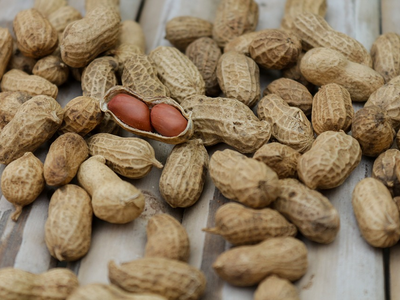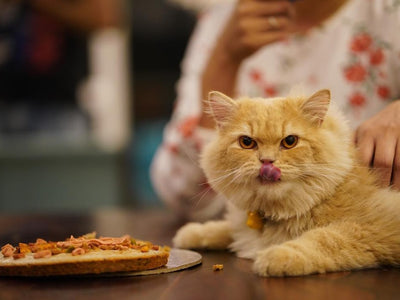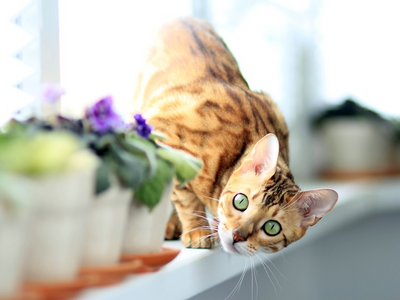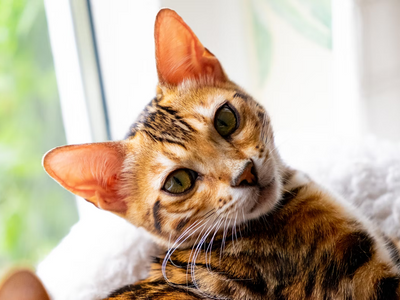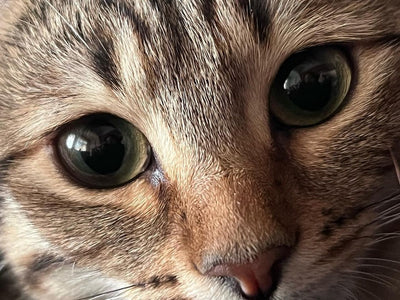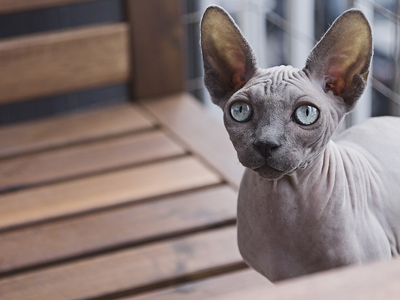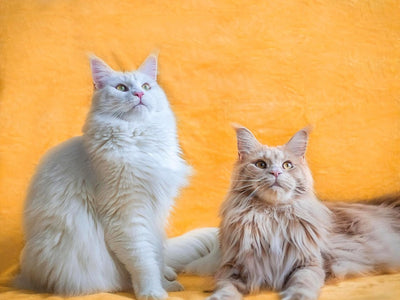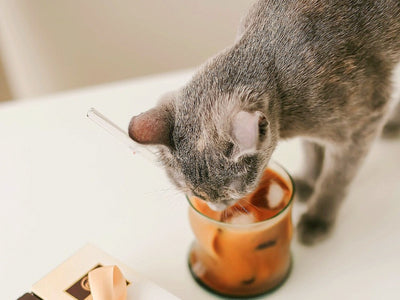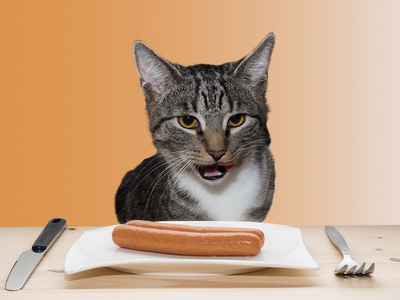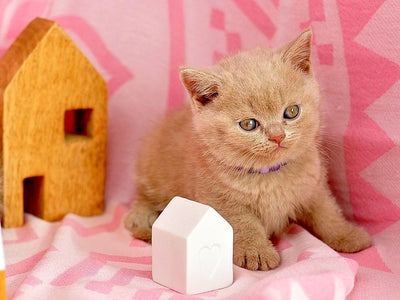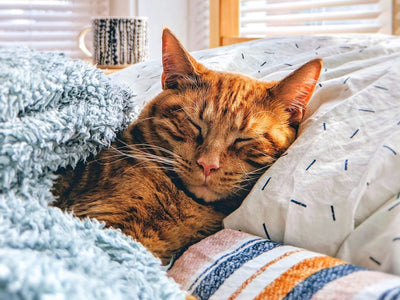07.02.2022
Is your cat being sick after eating? Find out what it means!
Does your kitty reject food and vomit when they eat? Seeing your cat struggling is devastating, but if you act promptly, you can help your kitty get better quickly. We’ll walk you through all the possible reasons behind your cat being sick after eating and explain:
- When the right time to involve a veterinarian is
- How to calm down your cat’s tummy before you take them to the vet
- Whether you can treat your kitty yourself
- How to prevent further stomach upsets
- What cats should eat after being sick and what quality foods make all the difference in a cat's diet
Why does my cat throw up their food?
Your cat can be sick for various reasons, depending on:
- How long it takes for them to throw up after a meal
- Whether the sickness comes after a particular type of food
- Whether they eat regularly
By tracking how frequently your cat vomits, what the contents look like, and other symptoms, you can help your vet diagnose your kitty faster and start them on adequate treatment or dietary regime.
My kitten is vomiting—should I be worried?
Kittens can get sick more often than adult cats, and the cause can be any of the following:
- Stress of rehoming
- Ingestion of potentially toxic house plants
- Gastrointestinal infections
- Travel sickness
- Trouble switching to solid food (weaning)—You can motivate slow weaners by providing different solid foods for them to try. Kittens are more motivated to try new food and have less trouble switching between foods if necessary
If several kittens in a litter are vomitting, it points to the queen suffering from mastitis, a condition that affects their teats and milk and causes infections in kittens. When a queen is sick, the kittens have to be separated as soon as possible and fed on formula.
Whichever reason behind your kittens’ sickness may be, you should take them to the vet as soon as possible. Kittens are fragile, and they mustn’t lose weight. Waiting too long before asking for professional help might lead to the death of one or more kittens.
Why is my older cat vomiting after eating?
The most common causes of nausea and sickness in older cats are:
- Chronic small intestinal disease
- Cancer (typically due to lymphoma—the rapid spreading of hostile white cells, also known as lymphocytes)
- Hyperthyroidism
- Kidney failure
If your senior furry friend is vomitting frequently, you ought to take them to a vet as soon as possible since their immune system isn’t as strong as that of a younger feline.
Why is my cat vomiting immediately after eating?
If your kitty ate too much food too fast, they might regurgitate. Regurgitation occurs before the food reaches the stomach to be digested, so the contents your cat regurgitates will usually be in the shape of:
- A tube
- A mushy pile
Another sign of regurgitation is that your kitty doesn’t struggle to get the food out. Regurgitation does not involve coughing or retching—the food just pops out. While regurgitation isn’t dangerous in itself, it can be a sign of an underlying condition and potentially make your cat dehydrated.
Can food be the reason why my cat is sick?
Sometimes, our furry friends struggle with digesting the simplest and most common of foods. Is your cat sick after eating dry food? Kitties who are switching from food in jelly or gravy to dry food or being introduced to one dry meal per day can get sick right after their meals, and here’s why:
- Biscuits are too big—Your cat might not chew dry food enough because they are used to the consistency of wet food. Big biscuits can cause a lot of trouble to your cat, from choking to regurgitation, but you can avoid these issues by:
- Switching to a brand with smaller biscuits
- Pouring some water or chicken broth over the dry food to soften it up and make it easier for your kitty to chew on and digest
- Your cat is obsessed with the new food's taste—Many cats get hooked on a specific type of food because of its taste. If the food is a novelty for your kitty and they fall in love with it, they might get a little too excited and eat too fast and too much, triggering regurgitation. In that case, try serving smaller meals more frequently until your cat gets used to the food in question. Keep in mind to stick to your kitty’s daily caloric intake when changing their diet

What do you mean by “dad already gave you breakfast”? I don’t know anything about that.
Source: Freepik
Why is my cat vomiting and not eating?
Some of the reasons why your kitty might refuse to eat are:
- Foreign objects in their body
- Kidney disease
- Inflammatory bowel disease
- Diabetes
- Liver disease
Reasons to stay nearby when you notice your cat is vomiting
If your furry friend is struggling, you should stay nearby to try and detect any other symptoms that could help a vet diagnose your kitty, such as:
|
Symptom |
Description |
|
Sneezing |
If your kitty is sneezing and vomiting profusely, the culprits behind it could be:
|
|
Defecating while vomiting |
Should your cat expulse contents from both ends of the digestive tract, that can be a sign of:
|
|
Drinking a lot |
If your cat appears thirstier than usual, they might be struggling with:
Cats can also vomit after they drink too much water, so make sure you:
|
|
Being constipated |
Should you notice your cat vomiting, and you know they haven't done a number two in a while, they might be constipated. Constipated cats are straining to poop, and the strain and abdominal pain combined can cause them to vomit |
What can you tell from your cat’s vomit?
The stomach contents that your cat vomits can tell you a lot about the root of the problem and help your vet make an accurate diagnosis quicker. It’s not a pleasant sight, but when your cat vomits, check the appearance of the contents. Consult the table to find out what the different colours and consistencies of the contents can mean:
|
Consistency |
Colour |
Causes |
|
Liquid |
Brown (blood) |
Blood further down the digestive system due to:
|
|
Clear |
Your kitty most likely drinks too much water |
|
|
Yellow (bile) |
An empty stomach because of:
|
|
|
Red (blood) |
|
|
|
Mushy or clumpy |
Brown |
Depending on how digested the contents are, your cat might be struggling with a:
|
|
Green |
The contents turn green if they come from the small intestines |
|
|
Foam |
White |
Inflamed:
|
When to let a vet investigate why your cat keeps being sick after eating
If your cat vomits often, you might wonder when the right time to get them checked professionally is. Your cat requires immediate medical attention if they:
- Vomit several times in a row
- Have one or more accompanying symptoms (for example, if your cat has diarrhoea, you will struggle to keep them hydrated without the help of a vet)
- Refuse to eat or drink for 12 hours after vomiting several times in a row
- Are already diagnosed with a severe illness (such as diabetes or hyperthyroidism)
- Have pale or cold gums
- Vomit a worm—Should your cat vomit a worm, all animals in the household need to deworm. You will also have to take extra care of your cat’s litter box to avoid:
- Your cat being reinfected after deworming
- Having any of your other pets infected
What can a vet do when your cat can’t keep food down?
Before making a diagnosis and suggesting proper treatment, the vet will ask you about:
- Odour, contents, and consistency of the vomitus (the projected contents)
- Diet changes or potential access to dangerous foods and substances, which include:
- Medication
- Human foods that are toxic to cats
- Insecticides or rat poison
- Other symptoms that occurred along with vomiting, such as:
- Weight loss that might have happened since your cat started vomiting
- Depression
- Lethargy
- Pain or distress
Making the diagnosis
To get a picture of what’s going on inside your cat’s body, the vet will suggest the following tests:
- Blood analysis
- Endoscopy (inspecting the stomach with a flexible tube with a camera and getting biopsy samples if necessary)
- X-ray
- Laparotomy (exploratory surgery commonly performed when a vet suspects that a cat has a foreign body stuck in the digestive tract)
- Ultrasound

Mom, if she does not stop touching me, I swear to claw…
Source: gpointstudio
Finding the appropriate treatment when a cat is sick after eating
Before prescribing any medicine, the vet will administer an intravenous fluid (IV) to your cat to help them rehydrate if the vomiting is persistent and aggressive. The treatment your vet suggests may depend on any illnesses your cat has and can include:
- Taking your cat off of food and water until the sickness stops
- Gradually introducing food again (often in the form of a special diet)
- Administering anti-inflammation medication, such as:
- Intravenous fluids
- Antiemetics (anti-vomiting medications), for example:
- Maropitant
- Ondansetron
- Dolasetron
- Stomach protectants, such as:
- Famotidine
- Ranitidine
- Hairball treatment
The vet should allow you to take your cat home and instruct you on administering the treatment properly if they aren’t in a critical state. Should your furry friend’s condition prove life-threatening, they might have to receive injections and be monitored until they get better.
Should you use over-the-counter medications on your own to stop feline vomiting after eating?
As a worried cat parent, you want to help your cat as soon as you notice that they’re sick. While you might consider administering meds on your own, over-the-counter medications can cause more harm than good. Sometimes, inappropriate treatment can even have a fatal outcome.
The most efficient way to combat your cat’s sickness is to follow the therapy your vet recommends and take notes of any changes in your furry friend’s state.
What can you do to help your cat until you go to the vet?
Even though you shouldn’t give any meds to your cat, you can ease your cat’s discomfort if you:
- Take them off of food for two hours
- Provide small amounts of water to keep them hydrated
- Offer a teaspoon of low-fat food (for example, chicken or white fish) after two hours have passed. If they don’t want to eat by themself, try warming up the food to body temperature (around 36°C), putting some on your finger, and gently placing it on their gums and teeth
- Feed them with small amounts of food every few hours if they don’t vomit again
If these steps don’t work, you might not have time to wait for an appointment at the vet, and you should find another one as soon as possible.

What do you mean by “we’re going to the vet”?
Source: Tatiana Аzatskaya
How to prevent your cat from being sick
If you are wondering whether there are ways to prevent vomitting in cats, you’ll be pleased to learn that all it takes is making some simple changes, such as:
- Grooming your cat more often—Your cat will have to do less grooming on their own and ingest fewer hairs in the process, eliminating the vomiting of hairballs
- Using hairball products—Some treats and gels can help your kitty get rid of those hairballs much easier
- Storing small objects in a safer way—You can prevent your cat from swallowing foreign objects by keeping them in a locked drawer or air-tight containers
- Not allowing your cat to enter rooms where pesticides or insecticides might be present—Out of sight, out of mind. By keeping your cat out of rooms with pesticides or insecticides, you’re preventing potentially fatal poisoning
- Avoiding house plants that are potentially toxic to cats—Some house plants that can cause trouble if your kitty munches on them are:
- Dieffenbachia
- Lilies
- Pothos (also known as devil’s ivy)
- Crassula ovata (also known as jade and money plant)
- Aloe vera
- Philodendron
- Caladium (elephant ear)
- Corn plant
- ZZ plant
- Storing foods that are bad for your cat somewhere they can’t reach them—Foods like chocolate, cheese, and milk should be kept out of paw’s reach, so don’t leave them out in the open
- Switching to a higher-quality diet—The benefits of a high-quality diet are countless, and your cat is bound to feel a million times better

Why is Mom hoarding these things in the house if I can’t play with them?
Source: Sam Lion
The fantastic impact a quality diet can have on your cat’s health
A high-quality diet is your cat’s tummy’s best friend! As obligate carnivores, cats digest animal-based protein much better than plant alternatives, but the benefits of animal-based protein don’t end there.
Did you know that natural oils, like fish oil, are natural remedies for hairballs? If your furry friend has trouble with pesky hairballs, our meals can help! All Untamed meals are made with sunflower oil, but you can also opt for Tuck-in Tuna and Full On Fishy if you need that extra e-fish-iency!

Our meals are a real catch!
Image (c) Untamed
Cats whose diet provides enough essential nutrients show improvements not only in digestion but all other aspects, too. Some of the most noticeable changes are:
- Softer and thicker coat, stronger claws—A hefty supply of protein will make your furry friend shine
- Stronger bones and teeth—A mineral-rich diet will keep your kitty strong and sturdy
- Increased immunity to allergens—Our hypoallergenic recipes help your cat’s skin protect itself from airborne allergens
Go for Untamed—because you want the best for your furry friend
Finding nutritious cat food in a market flooded with fishy brands is not easy. As tempting as some cat foods can be because of their low prices, they might cost your cat their health.
Say goodbye to filler ingredients and potentially harmful chemicals with Untamed! In our recipes, we wouldn’t use any ingredients that we wouldn’t eat ourselves, which is why only the finest meat and fish make it to our final cut. Try Untamed and treat your kitty to the gourmet, tailor-made meals they deserve. Get the quality of home-cooked cat food in a more convenient way—no prep, defrosting, or additional cooking!
Your cat’s tummy will thank you!
Our vet-formulated meals feature whole meats, a bit of chicken broth, and a dash of sunflower oil to keep that tummy working like a Swiss clock! After switching to Untamed, many members of our wild pack report better stool since day one and fewer hairballs a few months later!

All this, for me?
Image (c) Untamed
More reasons to switch to Untamed right meow!
If you decide to give Untamed cat food subscription a try, you might also notice the following improvements in your cat:
- Higher energy levels and increased playfulness due to the high protein and healthy fat content in our meals
- Consistent weight control thanks to our pre-portioned, ready to serve meals
Get your cat’s purrsonal meal pack today!
What does it take to become a member of the Untamed pack? With us, ordering cat food online is simple and takes only a couple of minutes. Here's what you should do:
- Visit our Try Now page
- Give us the details about your furry friend, such as:
- Name
- Food preferences
- Amount of tins they need
- Order a trial pack
We will deliver the order to your doorstep within a day. Our shipping is always free!
If your cat likes our stuff, we can replenish your pantry stock every month. You can modify, postpone, postpone, or skip an order anytime!
The cherry on top is our gorgeous eco-friendly packaging that keeps the food fresh and helps preserve our planet!

![Associated image for What human food can Sphynx cats eat? [Comprehensive list]](http://untamed.com/cdn/shop/articles/what_human_food_can_sphynx_cats_eat_Featured_400x300_crop_center.jpg?v=1648705074)
